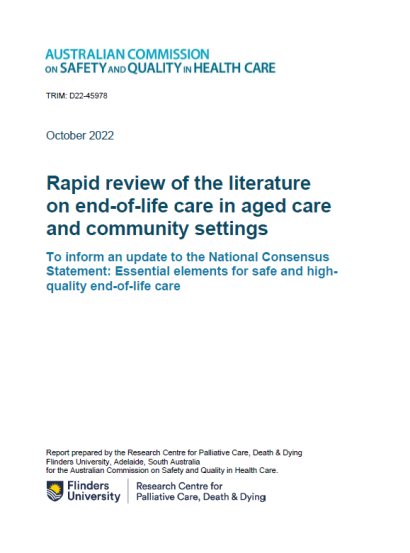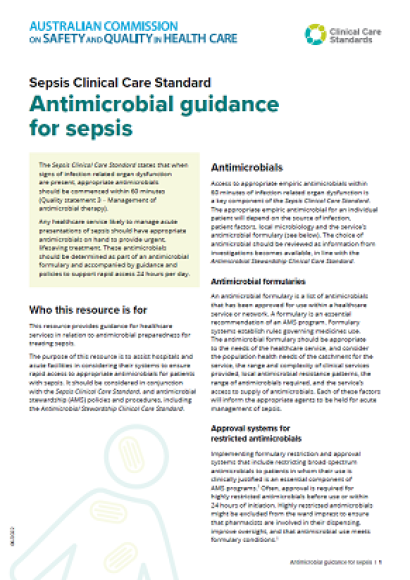The Commission leads and coordinates national initiatives to reduce harm associated with transitions of care. This work addresses the risks for patients moving between healthcare providers including primary, community, acute, subacute, and aged and disability care. Information developed by the Commission helps health service organisations and clinicians identify and implement strategies for improvement.
Guidance for clinicians on the eight quality statements from the Low Back Pain Clinical Care Standard, as well as helpful resources.
Lessons learnt from the assessment of health service organisations to the National Safety and Quality Health Service (NSQHS) Standards.
Information for healthcare services to guide practice and monitor improvement using the clinical care standard, and resources to support implementation.
The Sepsis Clinical Care Standard describes the health care that should be provided to patients with signs and symptoms of sepsis. It also addresses the care that should be provided in hospital and after discharge, including survivorship.
Guidance for clinicians on the seven quality statements from the Sepsis Clinical Care Standard, as well as helpful resources.
A patient who has survived sepsis receives individualised follow-up care to optimise functional outcomes, minimise recurrence, reduce rehospitalisation and manage the ongoing health effects of sepsis. This requires structured, holistic and coordinated post-discharge care and education that involves the patient, their family, carer, general practitioner and other clinicians.
Support and information are provided to the family or carer of a patient who has died from sepsis.
A patient with known or suspected sepsis has a documented clinical handover at transitions of care. This includes the provisional sepsis diagnosis, comorbidities, and the management plan for medicines and medical conditions. This information is provided to the patient, their family and carer as appropriate.
A patient, their family or carer is informed about sepsis from the time that it is suspected in a way that they can understand. Information includes the expected treatment and potential health effects of sepsis. Information is provided verbally and in writing.
The Sepsis Clinical Care Standard includes seven quality statements describing the key components of care that a patient presenting with signs and symptoms of sepsis should receive so that the risk of death or ongoing morbidity is reduced.
Sepsis is a complex, multisystem disease requiring a multidisciplinary approach to treatment. A patient with sepsis has their treatment in hospital coordinated by a clinician with expertise in managing patients with sepsis.
A patient with suspected sepsis has blood cultures taken immediately, ensuring that this does not delay the administration of appropriate antimicrobial therapy. When signs of infection-related organ dysfunction are present, appropriate antimicrobials are started within 60 minutes. Antimicrobial therapy is managed in line with the Antimicrobial Stewardship Clinical Care Standard, including a review within 48 hours from the first dose.
Sepsis is a time-critical medical emergency. Assessment and treatment of a patient with suspected sepsis are started urgently according to a locally approved clinical pathway, and their response to treatment is monitored and reviewed. The patient is reviewed by a clinician experienced in recognising and managing sepsis, and is escalated to a higher level of care when required.
A diagnosis of sepsis is considered in any patient with an acute illness or clinical deterioration that may be due to infection. A clinical support tool that includes assessment of vital signs and lactate is used to help recognise sepsis early and escalate care when required.
A number of related resources have been identified which are relevant to the Sepsis Clinical Care Standard.
Resources to support implementation by healthcare services and clinicians including guidance and information, tools, templates, consumer resources, implementation case studies and podcasts.
Healthcare services implement systems and processes to maximise safe, high-quality care and minimise clinical safety risks.


